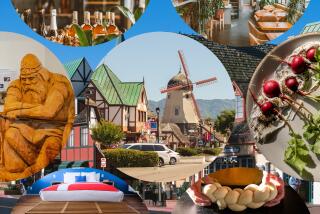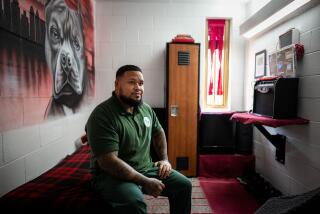Danish Commune Comes of Age
- Share via
COPENHAGEN — Don’t trust anyone over 30.
That was the student revolutionary’s refrain around the time a few dozen longhaired malcontents seized an abandoned Copenhagen military fortress in 1971 and proclaimed the free state of Christiania.
But as Europe’s most famous counterculture commune turns the Big 3-0 this summer, many among the now 700-plus residents admit that they have traded idealism and principle for heat and indoor plumbing.
From chirping cell phones to modern waterfront homes no less lavish for being illegal, Christianites are looking decidedly Establishment these days.
Except for the soft-drug emporiums along Pusher Street and the lack of paved roads and cars, Christiania is a fairly unremarkable neighborhood. No longer squatters since negotiating legal status with the government six years ago, Christianites now pay taxes and utility bills to the Danish Defense Ministry--their de facto landlord--and commune administrators bear much resemblance to a small-town city council.
Founded to create an alternative to life in Scandinavia’s highly regulated cities, Christiania had only three rules in the beginning: No cars. No violence. No hard drugs. Today, however, the commune’s rules could rival a fussy condo association’s.
Well-heeled Christianites can flout city regulations under their legalized outlaw status when building elegant homes along the old fortress points and promontories affording regal views across Oresund strait. But their building and expansion plans must pass muster among aging and cantankerous neighbors--often a tougher court than law-abiding city planners. Homes must be 100% ecological, and any registered resident can nix building plans, whether on justifiable grounds, whim or vengeance.
Social life also espouses suburban values: The community subsidizes breakfast at the Woodstock Cafe to make sure all Christianites get proper nutrition.
“If you don’t get the right start in the morning, you can drift around all day,” Siv Jarto, an occasional commune employee and tour guide, says--as if she were the first to have come to that conclusion. At one of Woodstock’s outdoor tables, made festive by a rare beam of northern sunshine, a fortysomething couple play backgammon while having their morning coffee and a marijuana cigarette.
In the center of the settlement, a beer garden is filled with tables shaded by umbrellas preaching “Say No to Hard Drugs.” There’s an Alcoholics Anonymous chapter and a 24-hour bakery. At least two businesses earn millions each year.
Christiania remains outside both city and Danish government structures, but the 1995 compromise worked out between the squatters and the Defense Ministry whose land they had seized has resulted in relative peace and stability between the self-governed statelet and the outside world.
In a survey this year for Copenhagen’s Extrabladet daily, 51% of Danes thought that Christiania should be shut down, while 49% were supportive of the alternative village. That straight-down-the-middle split in public opinion has prevailed throughout the enclave’s existence, making it politically difficult for authorities to move against the social rebels.
Even if there were pressure to evacuate the commune, its sprawl across 85 acres that include an elongated island and fortress remnants thwarts effective police action. Several raids on Christiania in the 1970s and ‘80s to crack down on drug sales prompted riots that forced police to settle for a few quick arrests on Pusher Street.
Today, despite its defection from the revolutionary vanguard, the leafy commune within walking distance of the Danish parliament and business center holds an enduring charm for those who want to walk on what was once the wild side.
“I feel like an ape in a cage sometimes,” says Jarto, who has lived in the commune for eight years, straddling the fence between the original squatters and newcomers drawn by the chance to peddle soft drugs. “I’ve actually had people walk into my house and say they just want to have a look.”
A 36-year-old single mother and self-trained soprano from Norway, Jarto has subsisted mostly on the largess of Oslo’s welfare system. But she, too, is traveling the route from fringe to mainstream. Just hired by the Copenhagen Classical Music Conservatory, Jarto says she will probably leave the commune to find a home on the “outside” by year’s end.
The knife of respectability has cleaved Christiania into rival camps. Old-timers who have mellowed with age want the pushers moved out. Younger would-be dealers resent the fact that their elders are trying to deny the new arrivals an indulgence their predecessors fiercely demanded for themselves.
“But nothing here is black and white,” cautions Soeren Raa, a co-founder of the successful Green Hall building materials network. “I have some very good friends who sell hash, but some of the others I’d like to see pushed out of the commune.”
Raa’s business salvages lumber, windows, plumbing and appliances from apartment houses in Copenhagen set for razing and has clearly benefited from Christiania’s legalization.
Only registered residents of the commune are supposed to be eligible to buy supplies at the store, because Christiania’s token sales taxes would otherwise undercut the law-abiding merchants on the outside. But with so much building and upgrading going on in the aging hippie commune, Green Hall had almost $1 million in sales last year--still third behind the bakery and the Christiania Bikes shop producing novel pedal-powered transport and delivery vehicles.
Christiania’s most famous product is also a victim of its own success. So many of the customized tricycles and trailers have been ordered from outside the commune that production had to be moved to a factory on the island of Bornholm, says founder Priben Smed. The parts are made on the island, then shipped back to Christiania for assembly and sale under a special tax arrangement.
An original settler who helped negotiate the Danish government’s tolerance policy toward Christiania, the 55-year-old bike maker says legality hasn’t spoiled the commune for those who left the rat race for sex, drugs and rock ‘n’ roll. But he concedes that it has changed the enclave.
“Christiania was developed in opposition to society, so the more legitimate we have become, the more boring,” says Smed, the Danish word for blacksmith that he adopted to reflect his calling. “It’s been good for those who want to create something. But it hasn’t been good for the fighters. We have no enemies anymore, and as with U.S. foreign policy, when the traditional enemies disappear, you look for new ones.”
The commune will survive legitimacy, as it has everything else, he says before making apologies that he has to get back to work: “It’s just a sort of evolution.”
More to Read
Sign up for Essential California
The most important California stories and recommendations in your inbox every morning.
You may occasionally receive promotional content from the Los Angeles Times.














